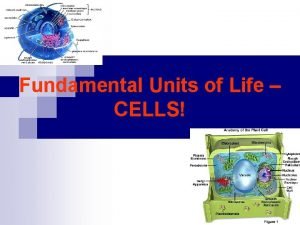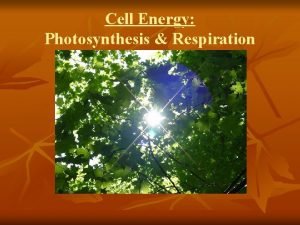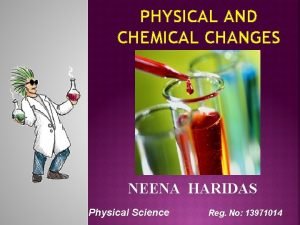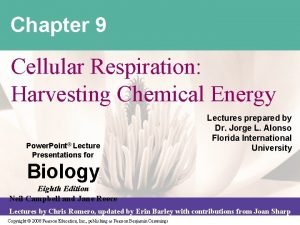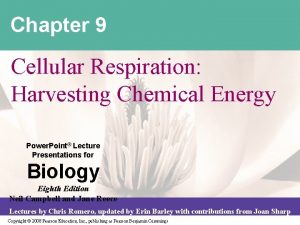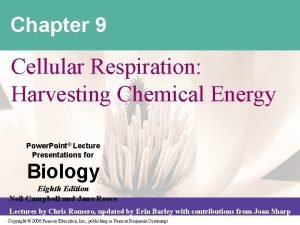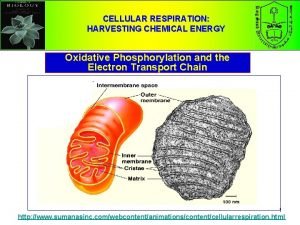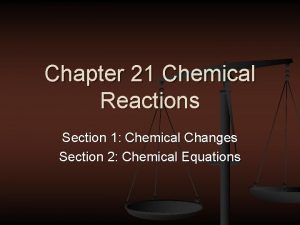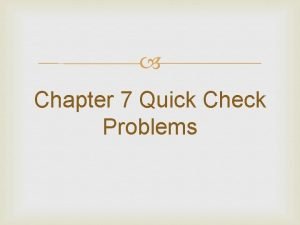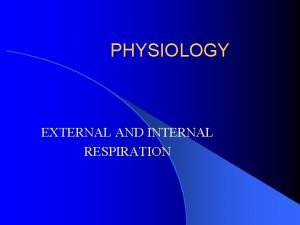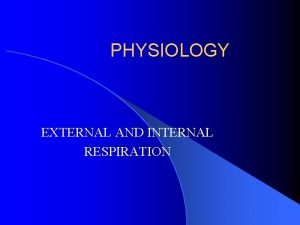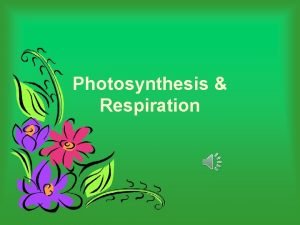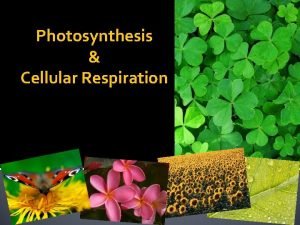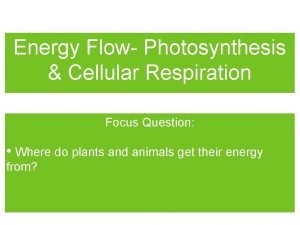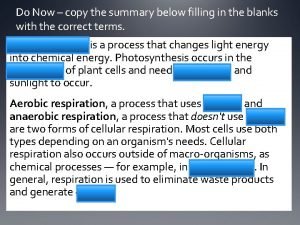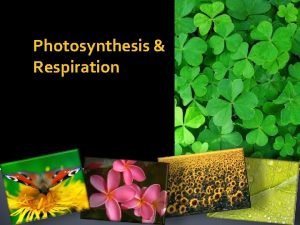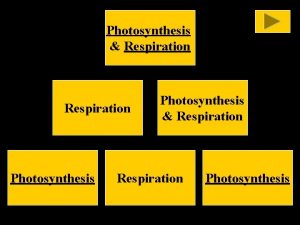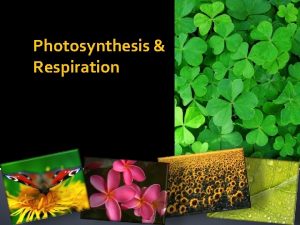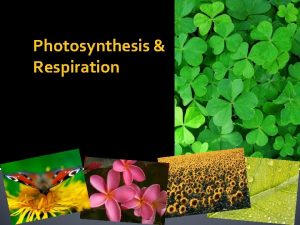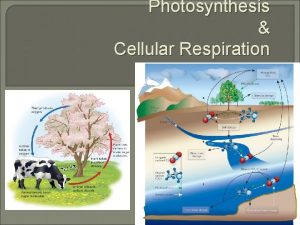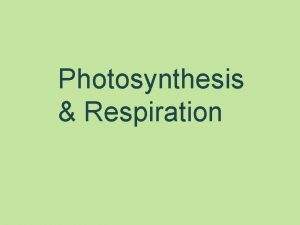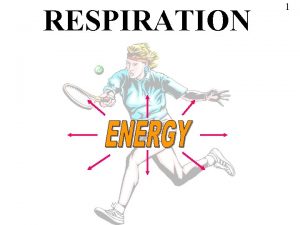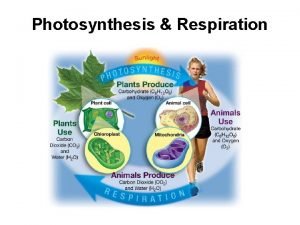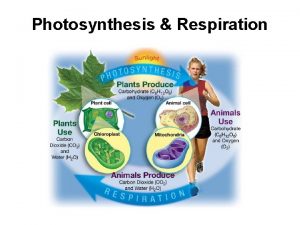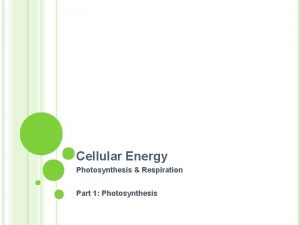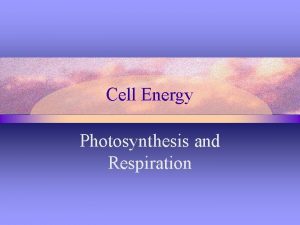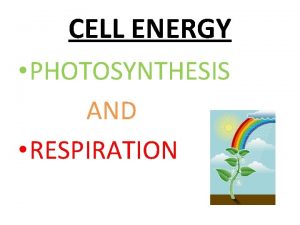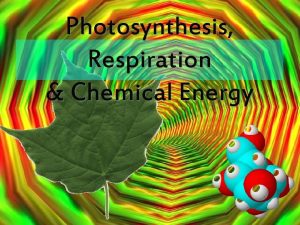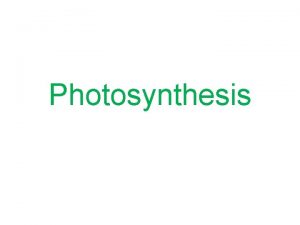Photosynthesis Respiration Chemical Energy Quick review Chemical Changes















- Slides: 15

Photosynthesis, Respiration & Chemical Energy

Quick review: Chemical Changes • Chemical reactions occur when old bonds break and new bonds form.

Chemical reactions involve two main changes that you can observe: – formation of new substances – changes in energy (ex: chemical to mechanical)

Pow H C Pow H Snap OPow O Snap Old Bonds Break New Bonds Form © Beadle, 2009

Living things get their energy from chemical reactions called: Photosynthesis and Respiration • Photosynthesis: – The energy of the sun powers the reactions of Water (H 2 O) and Carbon Dioxide (CO 2) in plants to make Glucose (C 6 H 12 O 6) and Oxygen (O 2 )(plant poop)! So what is the Photosynthesis rxn formula? • Respiration: – Animals breath in O 2 and eat plants for Glucose (the most basic food). Then they exhale Carbon Dioxide and water. So what is the Respiration rxn formula?

Photosynthesis (endothermic reaction) Photosynthesis takes place in the Plant Cells The Chloroplasts are where Light, water and Carbon Dioxide are processed into glucose and oxygen Chloroplast

Photosynthesis (Molecules go in…) Sun Light Energy Carbon Dioxide molecules Chloroplasts Water molecules © Beadle, 2009

Photosynthesis (New ones come out…) Oxygen is a waste product that leaves the plant (plant poop!) Energy Stored Inside (Potential Chemical) Glucose is used by the plant for it’s food Chloroplasts Without Photosynthesis, nothing else could exist on this planet! YEAH! Go hug a tree and say “thanks!”

Respiration (Exothermic Reaction) Respiration takes place in the animal cells Mitochondria (Human Cell) © Beadle, 2009 The “Mitochondria” is where chemical energy is converted into mechanical and heat energy

Respiration (Molecules go in…) Glucose Molecule Oxygen Molecules Mitochondria (Human Cell) Oxygen and Glucose molecules react with each other in the mitochondria and form neware molecules Our bodies designed to unpack that energy our bodies usestored the released energy in the sugar through a series of to exothermic do stuff reactions. © Beadle, 2009

Respiration (Different ones come out…) Unpack Stored Energy (Released Energy) Mitochondria (Human Cell) © Beadle, 2009 Note: The process by which sugar is broken down is a lot more complicated than a just a simple reduction of sugar – You’ll learn how in your Biology class in High School.

Energy Transformation Sequence: Sun Unpack Stored Energy Released in Mechanical & Heat Energy Light Energy 1. Light comes from the sun 2. Plants convert that energy into chemical energy via sugar 3. We eat the sugar and convert that energy into heat & mechanical energy Chemical Energy Mechanical & Heat Energy

Now we send back our “waste products” to the plants! Every time we exhale, we send CO 2 and H 2 O back to plants Plants change the CO 2 and H 2 O into Glucose and O 2 that comes back to us

Why is this cycle so important? • Remember the of the Stromatolites… 4 Billion years ago, tragedy the atmosphere was mostly CO , Which is GREAT for photosynthesis!!! 2 Moral: NOTHING CAN SURVIVE Some. IN still survive today. OWN as you can WASTE!!!! see in this picture: IT’S All the CO 2 in the atmosphere eventually became O 2. Stromatolites are the earliest form of life we have Which means what for our Stromatolite friends…? ever found… the first ones, maybe as long as 4 BILLION years ago!!! They are living bacteria that form rock like features when they grow together. It looks a bit like a coral reef They (like modern plants) did Photosynthesis Moral: NOTHING CAN SURVIVE But there were NO animals around yet…why is this a problem? IN IT’S OWN WASTE!!!! A: There were no critters to turn the O 2 back into CO 2, and the Stromatolites died off!!! Poor things…

How long would you last…? Stuck in a sealed room with nothing but CO 2?
 Photosynthesis transforms light energy into chemical energy
Photosynthesis transforms light energy into chemical energy Chapter 6 cell energy photosynthesis and respiration
Chapter 6 cell energy photosynthesis and respiration Examples for chemical change
Examples for chemical change Cellular respiration harvesting chemical energy
Cellular respiration harvesting chemical energy Explain how amp stimulates cellular respiration
Explain how amp stimulates cellular respiration Chapter 9: cellular respiration: harvesting chemical energy
Chapter 9: cellular respiration: harvesting chemical energy Electron transport chain summary
Electron transport chain summary Section 1 chemical changes
Section 1 chemical changes Quick find algorithm
Quick find algorithm The fan blade is speeding up. what are the signs of
The fan blade is speeding up. what are the signs of External vs internal respiration
External vs internal respiration External and internal respiration
External and internal respiration Complimentary processes
Complimentary processes Are photosynthesis and cellular respiration opposites
Are photosynthesis and cellular respiration opposites Equation for cell respiration
Equation for cell respiration Venn diagram photosynthesis and respiration
Venn diagram photosynthesis and respiration
